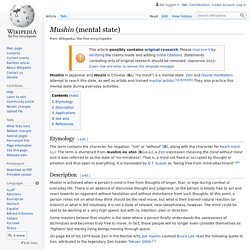

What is Emptiness in Buddhism? The word for “empty” (sunna in Pali, shunya in Sanskrit) is used by the Buddha as a simple adjective to describe, for example, an empty room: “There are empty huts, monks.

Meditate!” The same sense is extended to express the core Buddhist teaching of non-self: just as a room may be empty of furniture, the mind and body are “empty of self and of anything belonging to self.” When the suffix -ta is added, the word takes the form of an abstract noun and is used to describe certain kinds of meditation. The Buddha tells his attendant monk Ananda in one of the two Discourses on Emptiness (Sunnata Sutta), “I often abide in emptiness,” and goes on to describe a meditation practice in which the objects of perception become gradually more subtle until one understands that “this field of perception is empty of the taints.”
At this point “emptiness” becomes virtually a synonym of nibbana or nirvana, defined in the early texts as a mind devoid (empty) of greed, hatred, and delusion. Immigrants Against Immigration? To begin with, I should tell that you it was not the strangest conversation I have ever had.

That it happened in the afternoon. That the day was warm, and I was flying that evening out of Miami, where I had done a reading and visited my parents. I had about an hour to visit my cousin, and I should tell you that I like this cousin. He is funny and smart and gay, and since I, too, am queer, I imagine we share a kinship beyond blood ties.
I should tell you that this cousin usually makes me laugh. The shades had been drawn to keep the apartment cool. “C’mon, tell me what you think,” my cousin insisted. People who think immigrants are necessarily pro-immigrant have not met my family. Equanimity is said to be an anchor. I wish I could say now that the conversation with my cousin about immigrant families at the border was the strangest, most troubling one I have experienced recently. My mind stopped, and so did the words in my mouth. Related: Finding Refuge in a Time of War. French-metta. Dependent Origination: The Twelve Links Explained - Tricycle: The Buddhist Review. Mindfulness definition. The Noble Eightfold Path: Meaning and Practice.
Tilopa's Six Nails. Mushin (mental state) Mushin is achieved when a person's mind is free from thoughts of anger, fear, or ego during combat or everyday life.

There is an absence of discursive thought and judgment, so the person is totally free to act and react towards an opponent without hesitation and without disturbance from such thoughts. At this point, a person relies not on what they think should be the next move, but what is their trained natural reaction (or instinct) or what is felt intuitively. It is not a state of relaxed, near-sleepfulness, however. The mind could be said to be working at a very high speed, but with no intention, plan or direction. Some masters believe that mushin is the state where a person finally understands the uselessness of techniques and becomes truly free to move. The mind must always be in the state of 'flowing,' for when it stops anywhere that means the flow is interrupted and it is this interruption that is injurious to the well-being of the mind.
The Void aka the blind spot of mind. That is exactly what blew my mind.

But the fact that at very least an observer had seen it, or knew it, or connected with it. Sent me into an intense study of science trying to figure this all out. For what ever reason it started with trying to create an equal lateral triangle. A perfect one without the use of a protractor, cause I didnt have one, or anyother compass or scribe. I knew that the simplicity is connecting 3 equal lines. Amour bienveillant. Déjà, qu'est-ce que l'amour bienveillant?

C'est premièrement le fait d'aimer tout le monde, car tout le monde recherche la même chose: le bonheur. Ensuite, aimer vraiment quelqu'un ne signifie pas être gentil avec lui / elle pour qu'il ou elle nous aime en retour. Ça se serait un sentiment directement relié à notre égo. Le vrai amour, c'est souhaiter le bonheur à quelqu'un, sans vouloir l'emprisonner, sans vouloir qu'il soit "à nous".
Juste essayer de lui apporter ce que nous pouvons lui apporter, sans attendre un quelconque retour de sa part. Cet amour est dit bienveillant, c'est à dire qu'il veille au bien. Quand on mélange les deux termes, que donne "amour-bienveillant"? Et bien, quand on aime quelqu'un, et qu'on ne cherche que son bien à lui, on est parfois obligé de faire quelque chose qui ne nous met pas forcément en valeur, de dire des choses désagréables, etc... Commencer la méditation en prenant refuge, et terminer en dédicaçant la pratique... comme toujours.